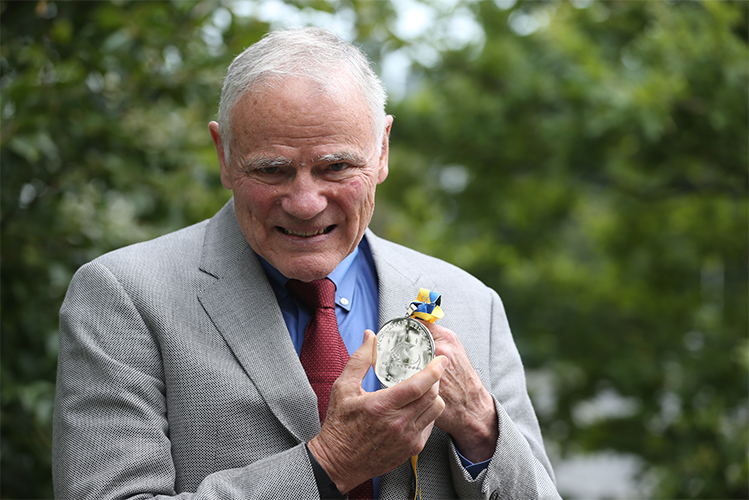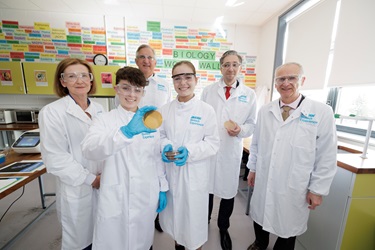Pioneering Systems Biologist Awarded UCD Ulysses Medal

University College Dublin’s highest honour, the UCD Ulysses Medal has been bestowed on Dr Lee Hood in recognition of his outstanding contributions to science. UCD Deputy President and Registrar, Professor Mark Rogers presented the award at the 2016 UCD Conway Festival of Research & Innovation.
Director of Systems Biology Ireland, Professor Walter Kolch gave the official citation. He described Dr Hood as “a visionary scientist who has been the cornerstone of many key technological transformations in the area of modern molecular biology”.
“Lee has been a seminal force in modern biological investigation, in particular his key role in the Human Genome Project and in his efforts since then to reap the fruits of this knowledge for clinical and commercial utility. He is undoubtedly, one of the most influential and impactful biomedical scientists of our time worldwide,” he said.
Dr Hood studied biology at California Institute of Technology (Caltech) before going on to Johns Hopkins School of Medicine where he was awarded an MD in 1964. He then returned to his alma mater to complete a PhD in Biochemistry focusing on the structure, genetics, and evolution of immunoglobulins.
His mentor at Caltech, William Dreyer instilled two fundamental beliefs in him that have since defined his work: always practice biology at the leading-edge; and if you really want to change biology, develop a new technology for pushing back the frontiers of biological knowledge.
Dr Hood was involved in the development of five instruments critical for contemporary biology—automated DNA sequencers, DNA synthesisers, protein sequencers, peptide synthesizers, and an ink jet printer for constructing DNA arrays.
“These instruments opened the door to high-throughput biological data and the era of big data in biology and medicine. Lee helped pioneer the human genome programme—making it possible with the automated DNA sequencer. Under Hood’s direction, the Human Genome Center sequenced portions of human chromosomes 14 and 15,” said Professor Kolch.
More recently, Dr Hood has been a leader in the development of systems biology, its applications to cancer, neurodegenerative disease and the linkage of systems biology to personalised medicine.
“At a time in life when many people might be enjoying or perhaps contemplating retirement, Lee Hood is now pioneering new approaches to P4 medicine—predictive, preventive, personalised and participatory approaches to scientific wellness. He has recently embarked on creating a P4 pilot project on 100,000 well individuals that is transforming healthcare,” said Professor Kolch.
Dr Hood has published 750 papers, received 36 patents, 17 honorary degrees and more than 100 awards and honors. His work has achieved more than 125,000 citations making him one of the most cited scientists worldwide. He is one of only 15 individuals elected to all three National Academies—the National Academy of Science, the National Academy of Engineering, and the Institute of Medicine.
He has founded or co-founded 15 different biotechnology companies including Amgen, Applied Biosystems, Rosetta, Darwin, Integrated Diagnostics, Indi Molecular and Arivale. He has an ongoing connection with Genomics Medicine Ireland, a new highly innovative biotech company located in NovaUCD and UCD Conway Institute.
The UCD Ulysses Medal was inaugurated in 2005, as part of the university’s sesquicentennial celebrations, to highlight the ‘creative brilliance’ of UCD alumnus James Joyce. It is awarded to individuals whose work has made an outstanding global contribution. Previous recipients include former US President, Bill Clinton; Nobel Prize-winning scientist, Professor Eric R Kandel; and Nobel Prize-winning poet, Seamus Heaney.
Dr Leroy Hood: Systems Medicine and Proactive P4 Medicine - Transforming healthcare through scientific wellness: a personal view
Ulysses Medal Lecture at 2016 Conway Festival of Research & Innovation

